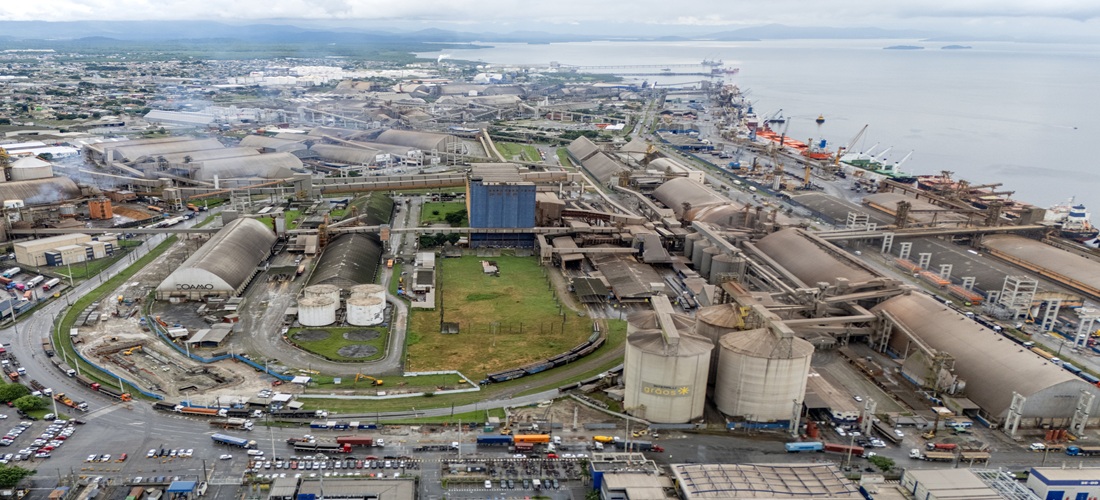
São Paulo Coast Congressman Calls for Legislative Debate on New Port Framework
Feb, 05, 2025 Posted by Gabriel MalheirosWeek 202506
Hugo Motta (Republicanos party), the newly elected Speaker of Brazil’s Chamber of Deputies, is expected to kick off discussions on a new legal framework for the country’s port sector in the coming weeks. The announcement comes from federal deputy Paulo Alexandre Barbos, a representative of the Santos region and now an alternate member of the Lower House’s new governing board.
The proposed legislation will be based on a draft submitted last November by the Commission of Legal Experts for the Revision of Port Laws and Regulations (Ceportos) to then-Speaker Arthur Lira, who did not advance the measure.
According to Barbosa, Motta has pledged to keep an open dialogue on the issue. “I spoke with Hugo about how important this matter is for the sector and the country. The Speaker should decide on the legislative process in the coming weeks,” he said.
The Ceportos proposal calls for decentralizing specific responsibilities under the Ministry of Ports and Airports (MPor), transferring some functions to the National Waterway Transport Agency (Antaq) and port authorities. It also aims to reduce the categories of independent dockworkers to just three: stevedores, cargo-handling personnel, and checkers.
In an interview last November, Douglas Alencar, a justice on the Superior Labor Court (TST) and then-president of Ceportos, explained that the goal is to modernize the legal framework by streamlining concession, leasing, and authorization processes at ports, enhancing legal certainty in contracts, and expanding employment opportunities by fostering workforce training in port operations.
Barbosa emphasized that the Joint Parliamentary Front for Ports and Airports (FPPA), which he chairs, played an active role in Ceportos discussions. “We want to expand our participation in this debate. I will closely monitor developments to ensure this remains a priority in the Chamber’s agenda,” he stated.
Regarding labor concerns, Barbosa called for a careful approach. “We need to pay special attention to workers. This issue must be analyzed with care. They will have the opportunity to voice their concerns, offer suggestions, and be heard in public hearings we will organize through the parliamentary front,” he assured.
On the regulatory front, Barbosa believes the draft legislation represents a significant step forward. He supports the proposed division of responsibilities between the federal government and Antaq. “Governance models and decentralization are issues we have always advocated for,” he said.
Barbosa also backed the proposal to extend contract durations for private operators, arguing that it would offer greater predictability for businesses.
“Our main goal is to drive economic growth and attract new investment while safeguarding jobs for port workers—the ones who built major hubs like the Port of Santos,” he said.
Strategic Role in the Chamber
As a member of the governing board, Barbosa now has an additional office in Annex II of the Chamber, near other board members and the main plenary, allowing him to provide technical support and conduct legislative analyses. He stated that he will hold biweekly meetings with Speaker Motta and other board members.
“For the next two years (2025-2026), I will play a strategic role in working groups dedicated to improving the legislative and administrative process, in addition to signing official acts and participating in decision-making,” Barbosa noted.
Uncertain Timeline for the Bill’s Progress
The draft legislation, submitted to the Chamber on November 6, 2024, has yet to be assigned to any committee and remains stalled.
Some provisions of the proposal face opposition from both the federal government and labor unions, while the private sector largely supports it.
For the initiative to move forward, a member of Congress must formally introduce it as a bill. Once that happens, it will be assigned to the relevant committees for deliberation.
Attempts to reach Speaker Hugo Motta’s press office for comment were unsuccessful at the time of publication.
Source: A Tribuna
-
Meat
Jun, 21, 2022
0
Canada to expand the range of Brazilian meatpackers allowed to export pork
-
Grains
Sep, 17, 2024
0
Anec Upgrades Brazil’s September Soybean, Corn Export Forecasts
-
Grains
Mar, 30, 2022
0
Argentine farmers sell 19.5M tonnes of maize in 21/22
-
Shipping
Jun, 20, 2024
0
Defence Intelligence Agency: Red Sea container shipping down by 90%

